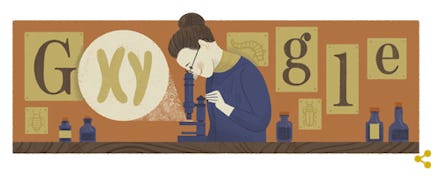Nettie Stevens Discovered XY Chromosomes — And Then a Man Took Credit for Her Work

Geneticist Nettie Stevens is renowned for her revolutionary research on XY chromosomes, the link between genetics and sex determination and why someone is born female or male. She was born 155 years ago today and she's remembered in the latest Google Doodle.
Still, most people haven't heard of her. Why? It's a classic Rosalind Franklin case. Stevens was yet another woman scientist robbed of proper credit as men were acclaimed for using her research.
Nettie Stevens was a pioneer: Stevens was alive at the end of the 19th century when most women were restricted to a handful of professions and marriage. Instead, after putting herself through school, she became a scientist and began researching chromosomes — small structures in the nucleus of cells that hold DNA. In her research with mealworms, she discovered that sperm contains either an X or Y chromosome, while an egg has only an X chromosome. An XX pairing would create a female and an XY pairing would create a male.
It was a profound insight: Previously, we had no idea how sex was determined. Many came to believe the mother determined the sex of the child or the mother's environment had some influence.
However, scientists didn't embrace her theory immediately. And today, Stevens almost never gets credit for making the discovery. The problem is that another male researcher, Edmund Wilson, made a similar discovery and published similar results around the same time as Stevens.
"It is generally stated that E.B. Wilson obtained the same results as Stevens, at the same time," historian Stephen Brush writes. However, "Wilson probably did not arrive at his conclusion on sex determination until after he had seen Stevens' results."
Brush later adds, "Because of Wilson's more substantial contributions in other areas, he tends to be given most of the credit for this discovery."
We've still got a long way to go before we see equality in science.
"Sometime in the 1970s or 1980s perhaps, overtly sexist comments went mostly underground but there is still resistance to full inclusion of women in the science enterprise," professor of physics and astronomy Meg Urry said in an email. "We know that implicit bias, insufficient mentoring, shifting criteria for evaluation, lack of role models and sexual harassment all play a role in preventing the full participation of women. Many are working hard to change this but we still have some distance to go."
Read more: